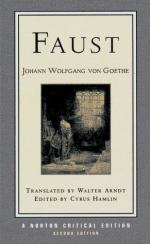[Footnote 12: “Salamander, &c.” The four represent the spirits of the four elements, fire, water, air, and earth, which Faust successively conjures, so that, if the monster belongs in any respect to this mundane sphere, he may be exorcized. But it turns out that he is beyond and beneath all.]
[Footnote 13: Here, of course, Faust makes the sign of the cross, or holds out a crucifix.]
[Footnote 14: “Fly-God,” i.e. Beelzebub.]
[Footnote 15: The “Drudenfuss,” or pentagram, was a pentagonal figure composed of three triangles, thus: [Illustration]
[Footnote 16: Doctor’s Feast. The inaugural feast given at taking a degree.]
[Footnote 17: “Blood.” When at the first invention of printing, the art was ascribed to the devil, the illuminated red ink parts were said by the people to be done in blood.]
[Footnote 18: “The Spanish boot” was an instrument of torture, like the Scottish boot mentioned in Old Mortality.]
[Footnote 19: “Encheiresin Naturae.” Literally, a handling of nature.]
[Footnote 20: Still a famous place of public resort and entertainment. On the wall are two old paintings of Faust’s carousal and his ride out of the door on a cask. One is accompanied by the following inscription, being two lines (Hexameter and Pentameter) broken into halves:—
“Vive, bibe, obgregare, memor
Fausti hujus et hujus
Poenae. Aderat clauda haec,
Ast erat ampla gradu. 1525.”
“Live, drink, be merry, remembering
This Faust and his
Punishment. It came slowly
But was in ample measure.”]
[Footnote 21:_Frosch, Brander_, &c. These names seem to be chosen with an eye to adaptation, Frosch meaning frog, and Brander fireship. “Frog” happens also to be the nickname the students give to a pupil of the gymnasium, or school preparatory to the university.]
[Footnote 22: Rippach is a village near Leipsic, and Mr. Hans was a fictitious personage about whom the students used to quiz greenhorns.]
[Footnote 23: The original means literally sea-cat. Retzsch says, it is the little ring-tailed monkey.]
[Footnote 24: One-time-one, i.e. multiplication-table.]
[Footnote 25: “Hand and glove.” The translator’s coincidence with Miss Swanwick here was entirely accidental. The German is “thou and thou,” alluding to the fact that intimate friends among the Germans, like the sect of Friends, call each other thou.]
[Footnote 26: The following is a literal translation of the song referred to:—
Were I a little bird,
Had I two wings of mine,
I’d fly to my dear;
But that can never be,
So I stay here.
Though I am far from thee,
Sleeping I’m near to thee,
Talk with my dear;
When I awake again,
I am alone.
Scarce is there an hour in the night,
When sleep does not take its flight,
And I think of thee,
How many thousand times
Thou gav’st thy heart to me.]




